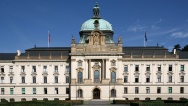Press Advisories
6. 9. 2018 20:15
Prime Minister Babiš discussed Czech-German cooperation, future of the European Union and migration with Chancellor Merkel
The Prime Minister visited Germany at the invitation of Chancellor Merkel, upkeeping the tradition of introductory visits to neighbouring countries. The topics of the meeting of the two politicians included Czech-German relationships as well as current European issues.
Prime Minister Babiš emphasized the high level of communication with German partners, which significantly flourished with the onset of the strategic dialogue. He would, therefore, like to continue to use it for the discussion about the priority areas of Czech-German cooperation such as science and research or cooperation of rescue and police forces as well as for the preparation of new joint projects. This year has marked 20 years since the establishment of the Czech-German Future Fund, which is an important part of Czech-German relations.
An important topic was transport infrastructure, especially the rail connection between Prague and Munich, which has to be modernized, and Prague and Dresden, where construction of a high-speed line is planned. That would, in addition to shortening the journey time between these cities, increase the capacity of the line for freight transport. In terms of economic usability, navigability of the Elbe is a key for the Czech Republic.
Germany is one of the largest foreign investors and is also the largest trading partner of the Czech Republic, with a share of 29. 4 per cent. In 2017, the total turnover of mutual trade was 89.5 billion EUR, which is almost a 10% increase in comparison with the previous year. “Germany is the most important trading partner for the Czech Republic. Our mutual trade relations are very strong. German companies invest in the Czech Republic, accounting for 16 per cent of investment. Me and the Chancellor also talked about cooperation in the area of Industry 4.0 and investment in science and research,” the Prime Minister said.
As regards European issues, Babiš and Merkel also discussed the multiannual financial framework, the future of the European Union, migration issues, and Brexit. Babiš believes that strengthening the unity and trust of citizens in the EU is a key. It is also necessary to ensure safety of citizens in Europe and to promote a strong and functioning asylum system. “It is not news that my opinions differ from those of Chancellor Merkel in some migration issues, especially on the redistribution of illegal migrants. We agree on the Marshall Plan for Africa according to the Turkish model. Today I presented a summary of our solidarity activities to her. We also talked about the draft EU budget, in which I see an opportunity to redirect tens of billions of EUR to projects focusing cooperation with the countries of Northern and Sub-Saharan Africa with the aim to put an end to illegal migration,” Czech Prime Minister said after the meeting and reminded that in June, EU leaders agreed on what we had been advocating, that mandatory quotas for the redistribution of illegal migrants are history. Both politicians also talked about international issues such as the situation in Ukraine or Syria.
Andrej Babiš discussed the future of the European Union and other international issues also with Wolfgang Schäuble, President of the Bundestag.
In the Deutsche Gesellschaft für Auswärtige Politik, the Prime Minister met with representatives of German think-tanks focusing on foreign policy. He said that Germany was a key partner for the Czech Republic in many areas, including European politics. He also reiterated that the European Union should return to its original mission, which is ensuring security and a functioning Union based on four freedoms: free movement of persons, goods, services and capital.
Andrej Babiš also laid a wreath for victims of the wall at the Berlin Wall memorial, and a bouquet at the Visegrad Four memorial.






